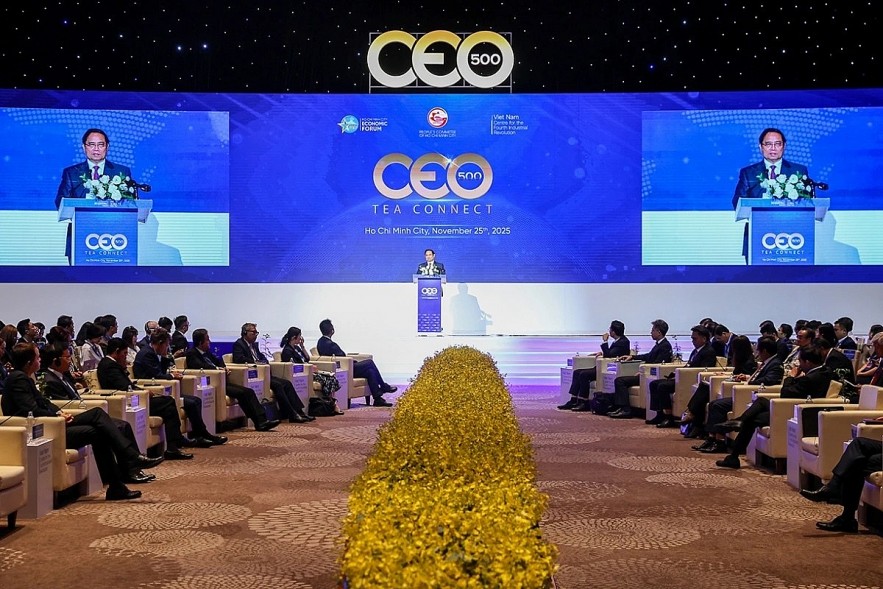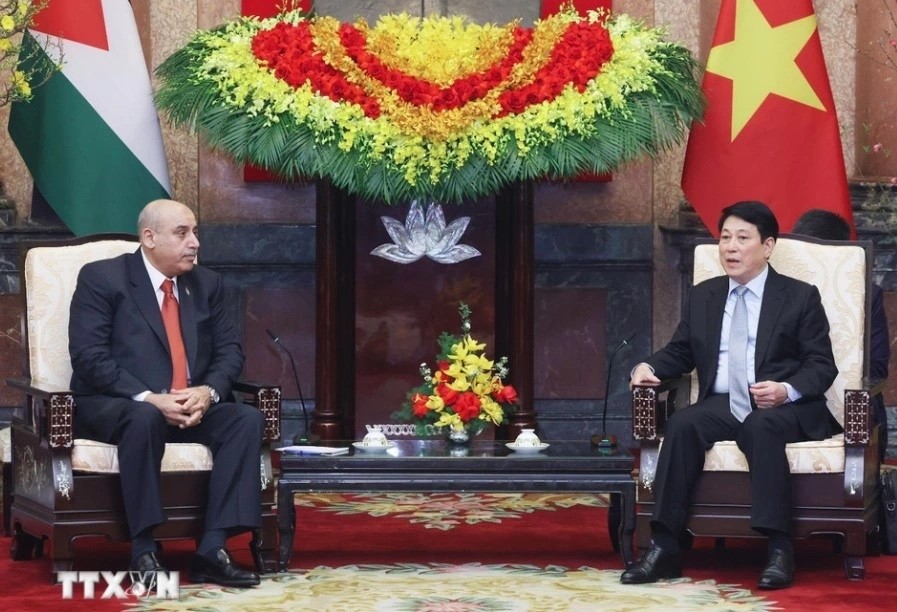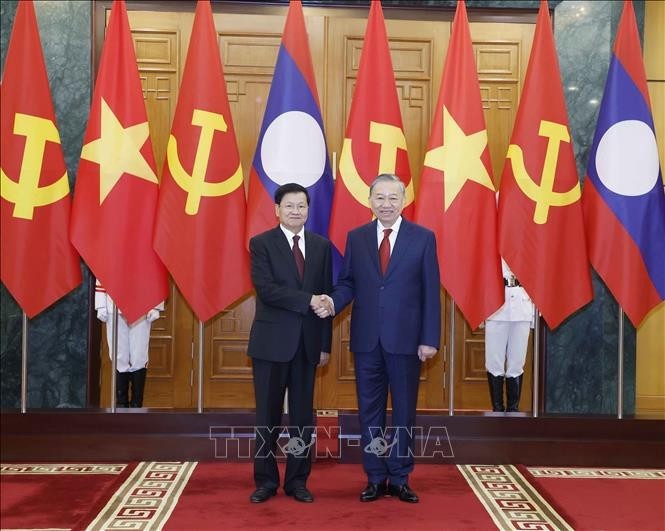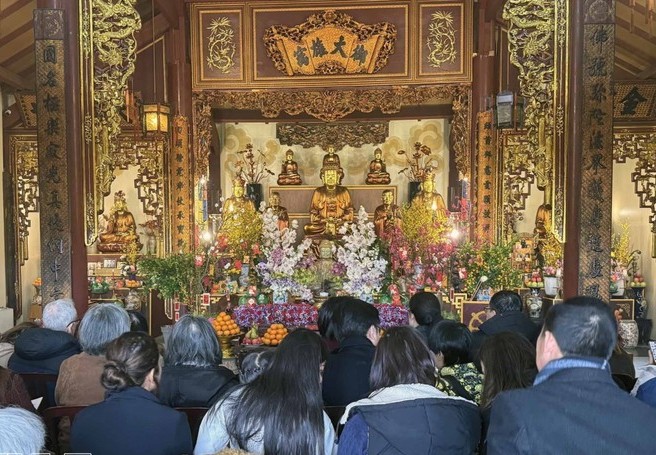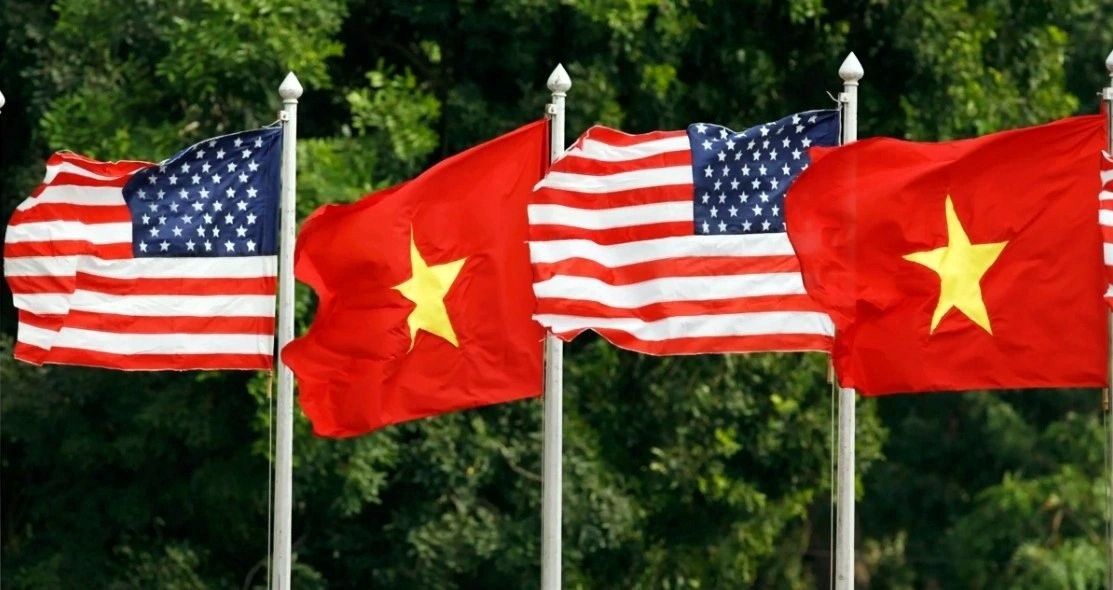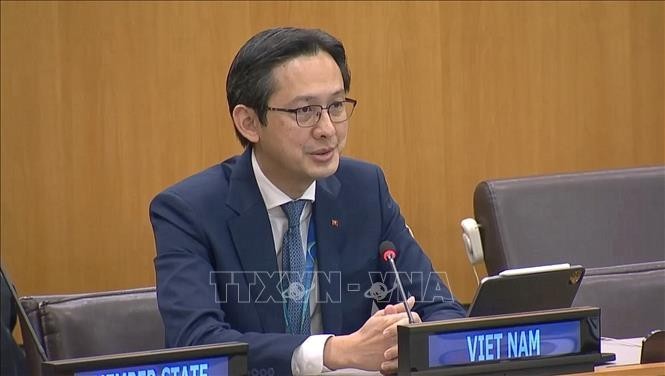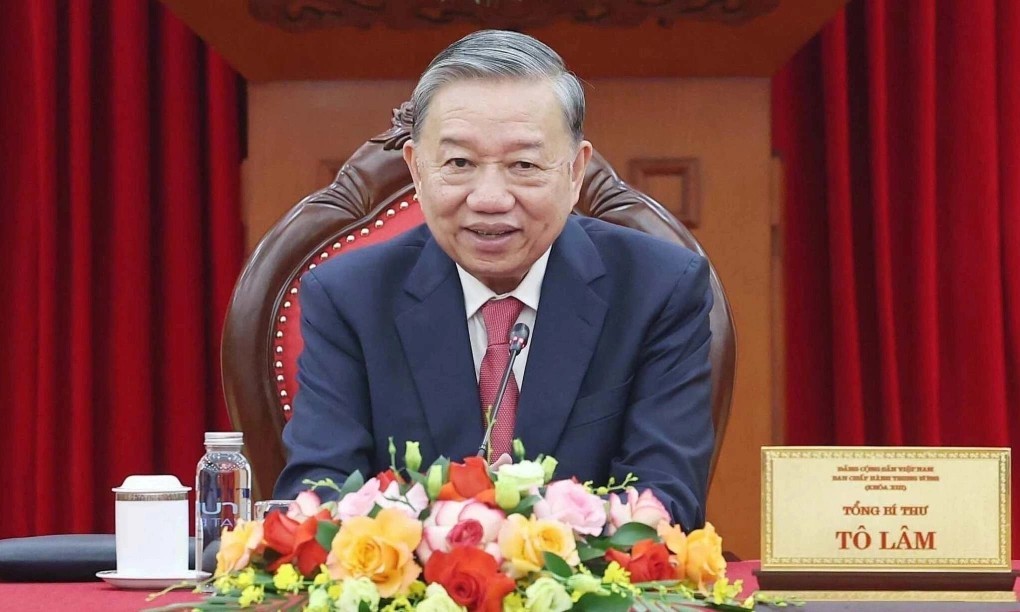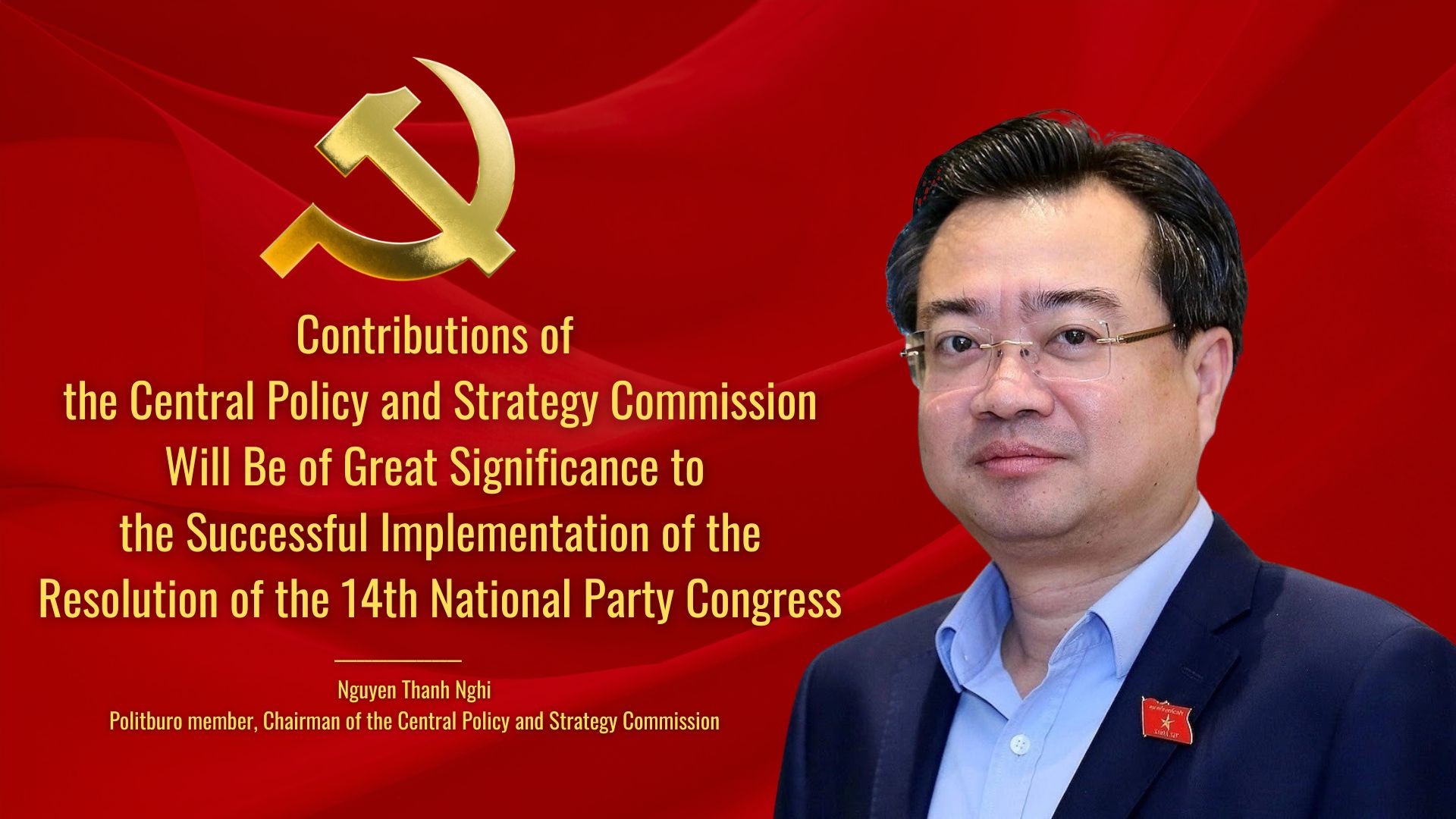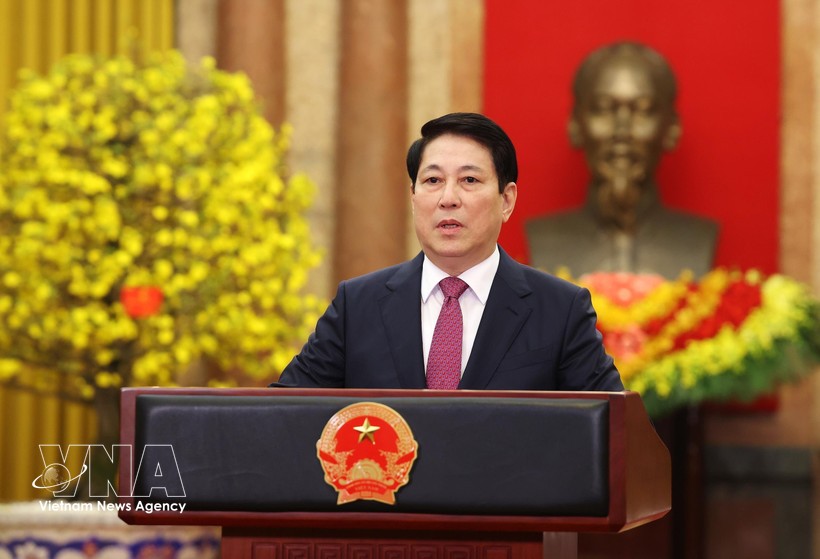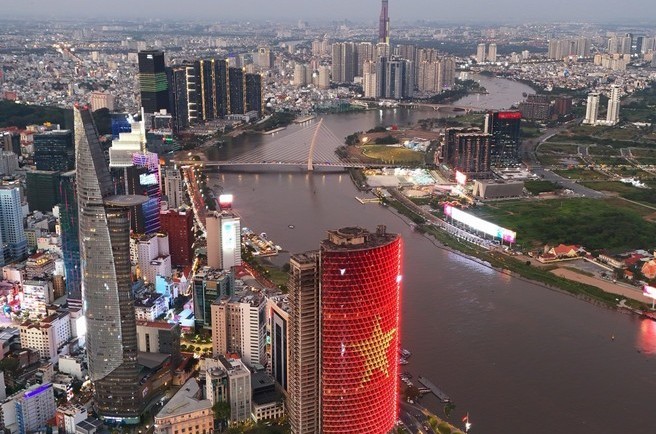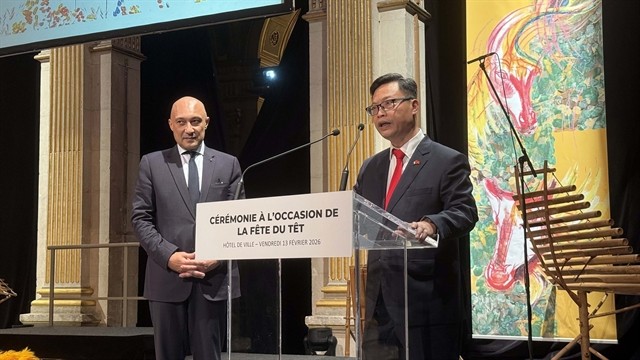Vietnam ready to share digital transformation experience with Laos
Deputy Prime Minister Bui Thanh Son met Lao Deputy Minister of Technology and Communications Saysanaa Sitthiphone in Ho Chi Minh City on November 25, affirming that Vietnam is ready to share its digital transformation experience with Laos.
Son warmly welcomed the Lao delegation to the 2025 Autumn Economic Forum which is taking place in Ho Chi Minh City and said the forum, the sixth of its kind, focuses on green transformation and digital transformation – the areas in which both Vietnam, Laos, and other ASEAN countries prioritise cooperation.
The Deputy Prime Minister reassured his guest the Vietnamese Party and Government always place great importance on promoting the special relationship and comprehensive cooperation between Vietnam and Laos, according to VOV.
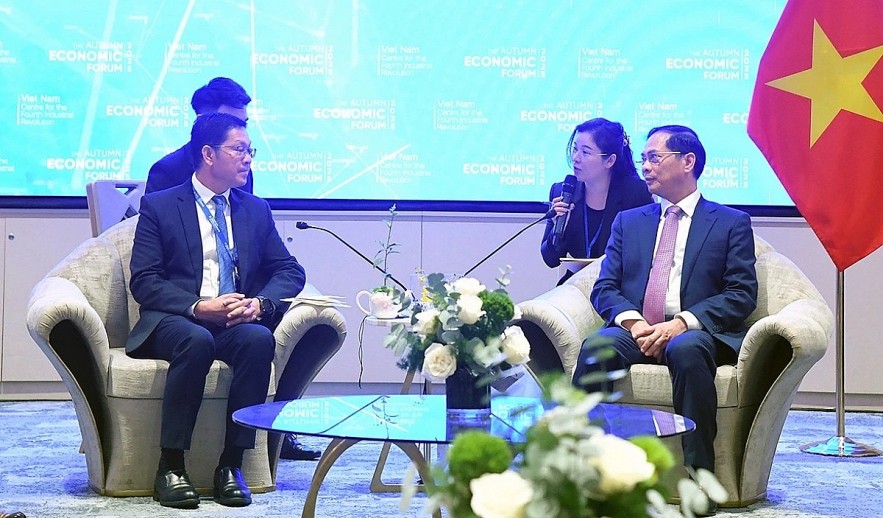 |
| Vietnamese Deputy Prime Minister Bui Thanh Son (R) meets Lao Deputy Minister of Technology and Communications Saysanaa Sitthiphone in Ho Chi Minh City on November 25 on the sidelines ò the 2025 Autumn Economic Forum. |
He praised the cooperation between Vietnam’s Ministry of Science and Technology and Laos' Ministry of Technology and Communications and urged both ministries to continue working closely together to effectively implement and concretize signed cooperation agreements, particularly in the fields of science, technology, innovation, and digital transformation.
For his part, Sitthiphone congratulated Vietnam on organising the forum, which addresses significant issues for the development of both Vietnam and Laos. He emphasized that the special solidarity between the two countries, founded by President Ho Chi Minh of Vietnam, and Presidents Kaysone Phomvihane and Souphanouvong of Laos, has become a priceless shared asset for both nations.
He thanked Vietnam for invaluable and timely assistance to Laos in its past struggle for national liberation and in the present cause of national defense and development, especially in the field of science and technology. He expressed hope that Vietnam would assist Laos in areas such as artificial intelligence (AI) applications, the building of data centers, digital transformation, the development of e-government, digital economy, and human resource development.
Son agreed with the Deputy Minister’s views and confirmed that Vietnam is ready to provide expertise for Laos. He encouraged Laos to create favourable conditions for Vietnamese businesses, such as Viettel and VNPT, to work with Lao counterparts to implement cooperative projects in these fields.
The Deputy Prime Minister also expressed willingness to collaborate with Laos in developing scientific and technological human resources, building startup ecosystems and data centers, and promoting cooperation at regional and international cybersecurity forums.
He expected that with the long-standing tradition of friendship and cooperation, the two ministries would continue to implement effective cooperation programs in the future, further strengthening the special relationship and comprehensive cooperation between Vietnam and Laos, making it more profound, practical, and effective.
Vietnam, EU hold sixth Joint Committee’s session to advance partnership
Vietnamese Deputy Minister of Foreign Affairs Le Thi Thu Hang and Acting Managing Director for Asia and the Pacific of the European External Action Service (EEAS) Paola Pampaloni co-chaired the 6th session of the Vietnam - EU Joint Committee in Brussels on November 24 to realise the Vietnam–EU Partnership and Cooperation Agreement (PCA).
Pampaloni opened the session by extending condolences to Vietnam over recent storm and flood damage. The EU has provided 850,000 EUR in humanitarian aid and is pressing member states for additional contributions. Luxembourg, Germany and the Czech Republic have already responded, with Luxembourg’s first relief shipment landing in Vietnam, she said.
Both sides shared updates on socio-economic conditions and foreign policy, while reviewing bilateral cooperation under existing frameworks, including the Defense-Security Dialogue, the Trade Committee tasked with implementing the EU-Vietnam Free Trade Agreement (EVFTA), and specialised subcommittees.
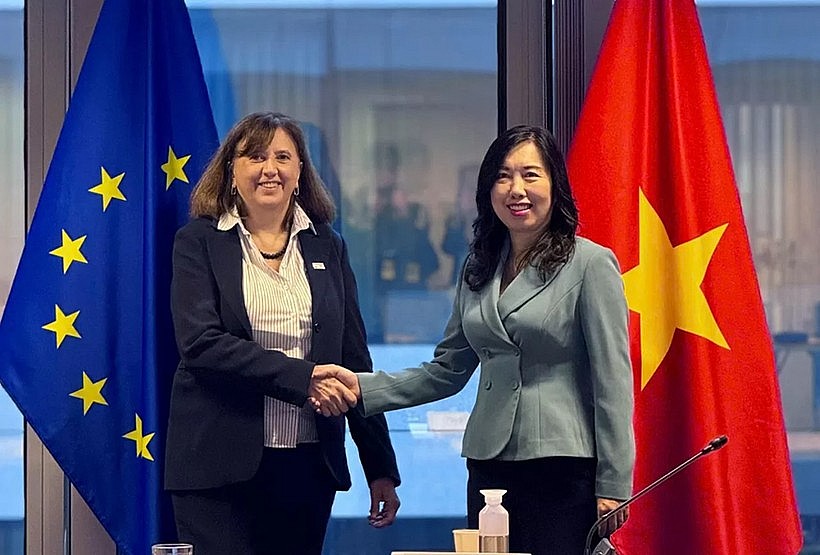 |
| Vietnamese Deputy Minister of Foreign Affairs Le Thi Thu Hang (R) and Acting Managing Director for Asia and the Pacific of EEAS Paola Pampaloni (Photo: baoquocte.vn) |
They agreed that Vietnam–EU relations have been growing after 35 years of diplomatic ties, citing increased political trust and regular exchanges of delegations at all levels, especially those at high level. Vietnam has established Comprehensive Strategic Partnership with France; Strategic Partnerships with Spain, Germany, Italy, the Czech Republic, Finland and Bulgaria; and Comprehensive Partnerships with Denmark, Hungary and the Netherlands. This is seen as a solid basis for further upgrading Vietnam - EU relations.
Cooperation in trade-investment, development, national defense-security, education-training, and climate response has gained traction. EU-backed programmes on public finance modernisation, economic governance and energy transition have proved effective.
The two sides vowed to step up high-level exchanges, ensure the EVFTA's effective implementation, and encourage the remaining six EU member states to soon ratify the EU–Vietnam Investment Protection Agreement (EVIPA). They also committed to fully utilizing existing cooperation and dialogue mechanisms.
Looking ahead, Vietnam and the EU promised to broaden collaboration in potential fields, particularly trade and investment, green economy, digital transformation, circular economy, sustainable fisheries, clean energy transition, sci-tech, innovation, infrastructure and climate adaptation, with sci-tech and innovation flagged as a new pillar.
Hang called on the EU to help Vietnam fully tap initiatives such as Erasmus+ (Education, Training, Youth, and Sports Programme), Horizon Europe (EU's largest research and innovation programme) and the Just Energy Transition Partnership (JETP). She also outlined Vietnam’s intensified efforts to combat illegal, unreported and unregulated (IUU) fishing and urged the EU and its member states to soon lift the “yellow card” warning. The EU acknowledged Vietnam’s progress and agreed to continue technical discussions.
Participants put forward specific proposals to boost cooperation in trade-investment, finance, agriculture, development, climate response and national defense-security.
The EU reaffirmed Vietnam’s status as a key partner in the Asia-Pacific, praising its socio-economic performance and global integration, and expressed hope that Vietnam would engage actively in the EU’s Indo-Pacific Strategy and Global Gateway Initiative.
Both sides reiterated backing for multilateralism and the role of the United Nations, stressing that maritime disputes must be settled peacefully in accordance with international law, particularly the 1982 UN Convention on the Law of the Sea (UNCLOS), while ensuring security, safety and freedom of navigation and overflight in the East Sea.
Vietnam and the EU also underlined the need to bolster the ASEAN-EU Strategic Partnership, expand trade-investment, tackle global challenges such as climate change, natural disasters, environmental degradation and pandemics, contributing to green and sustainable development in sub-regions, including the Greater Mekong Sub-region.
The meeting concluded with a joint commitment to deepen comprehensive cooperation, fully leverage existing dialogue mechanisms and expand collaboration in promising areas, setting the stage for a more substantive and sustainable bilateral partnership in the years ahead.
Vietnamese, Cuban parties boost cooperation in theoretical, scientific research
A delegation from the Scientific Council of the Communist Party of Vietnam (CPV) commissions visited Cuba from November 16 to 24 to deepen cooperation and share experience in theoretical and scientific research.
At a reception for the delegation, Roberto Morales Ojeda, Politburo member, Permanent Member of the Secretariat of the Communist Party of Cuba (PCC) Central Committee, and head of its Organization Commission, offered condolences to the Vietnamese people and Government on the flood losses in the central region, and thanked Vietnam for the solidarity extended to Cuba in response to the aftermath of Hurricane Melissa.
He said the mutual support in such trying times further reflect the solidarity, special friendship, and comprehensive cooperation between the two fraternal countries.
He also highlighted the value of Vietnam’s experience during the preparation for the 14th National Party Congress, scheduled for January 2026, an undertaking that parallels Cuba’s preparations for its ninth National Party Congress, set for April 2026.
Vu Thanh Mai, Vice Chairman of the CPV Central Committee’s Commission for Information, Education and Mass Mobilisation, affirmed that the Vietnamese Party, State, and people consistently stand with the Cuban people in all circumstances, reiterating Vietnam’s unwavering opposition to the embargo against and the listing of Cuba as a state sponsor of terrorism.
He added that the support and assistance for the Cuban people to surmount current economic difficulties are an order from the heart.
During their stay, the delegation held working sessions with PCC officials, including head of the Economic – Productive Department Jorge Luis Broche Lorenzo, head of the Social Sector Care Department Rolando Yero, as well as the leadership of the Nico Lopez Party School.
The meetings advanced discussions from the sixth theory workshop between the two parties held in Havana earlier this year, with the two sides planning to convene the next workshop after their upcoming national congresses, VNA reported.
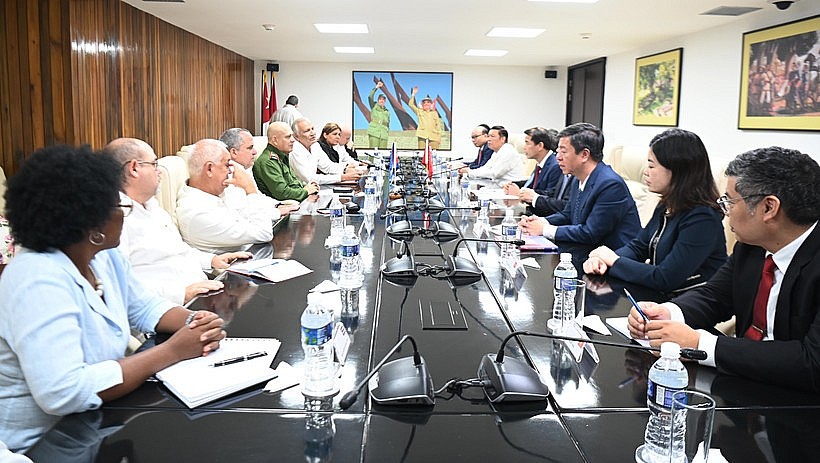 |
| The meeting between the delegation from the Scientific Council of the Communist Party of Vietnam commissions and Roberto Morales Ojeda, Politburo member, Permanent Member of the Secretariat of the Communist Party of Cuba Central Committee, and head of its Organisation Commission (Photo: VNA) |
During a meeting with Fernando Gonzalez Llort, President of the Cuban Institute of Friendship with the Peoples (ICAP), both sides highlighted the important role of mass organizations in fostering the long-standing Vietnam – Cuba friendship. Gonzalez Llort, a Cuban hero, shared his desire to further boost cooperation with Vietnamese friendship organizations and emphasised the need to inspire younger generations with patriotism and an appreciation for the special bond between the two nations.
The Vietnamese delegation also visited Pinar del Rio and Matanzas provinces to explore economic strengths and cooperation potential in investment and trade. The PCC secretaries of the two provinces, Yamile Ramos Cordero and Mario Felipe Sabines Lorenzo, called for greater Vietnamese investment, particularly in agriculture, biotechnology, renewable energy and tourism, and pledged to create favourable conditions for Vietnamese investors.
The delegation also toured local production facilities and the Matanzas provincial Hospital, and laid flowers at the statue of President Ho Chi Minh at the park named after him in Havana.
Tropical storm No. 15 likely to form on Nov 26, cold fronts on the way
According to the National Center for Hydro-Meteorological Forecasting, as of 1 p.m. on November 25, the center of the tropical depression was located over the western waters of the central Philippines.
Maximum sustained winds near the center reached level 7 (50–61 km/h), with gusts at level 9. The system is moving quickly to the west-northwest at around 30 km/h.
Over the next 24 hours, it is expected to continue heading west-northwest at 20–25 km/h and enter the East Sea. Once inside Vietnamese waters, it is likely to strengthen into the 15th named storm of the year.
By 1 p.m. on November 26, the storm’s center is expected to be over the eastern part of the central East Sea, with winds strengthening to level 9 and gusts reaching level 11.
In the following 24 hours, it will maintain its direction, slow to 10–15 km/h, and may continue to intensify. By 1 p.m. on November 27, the center is forecast to lie over the central East Sea with winds at level 10 and gusts at level 12.
From 48 to 72 hours after that, the storm is projected to move slowly westward at 5–10 km/h and could further strengthen.
Earlier, meteorologists warned that the storm could track toward the southern central coast, potentially impacting areas from Gia Lai to Lam Dong (formerly the provinces from Binh Dinh to Binh Thuan). The main period of influence is expected from November 28 to 30.
However, once it nears the coastline, the storm may weaken due to interaction with incoming cold air masses and the lower sea surface temperatures in the southern East Sea. When it makes landfall, the system may bring winds equivalent to a level 8–9 storm or degrade into a tropical depression.
Initial forecasts (subject to change) indicate that between November 28 and 30, widespread heavy rainfall could affect areas from Da Nang to Lam Dong, with the heaviest rains likely along the coastal stretch, cited VNN.
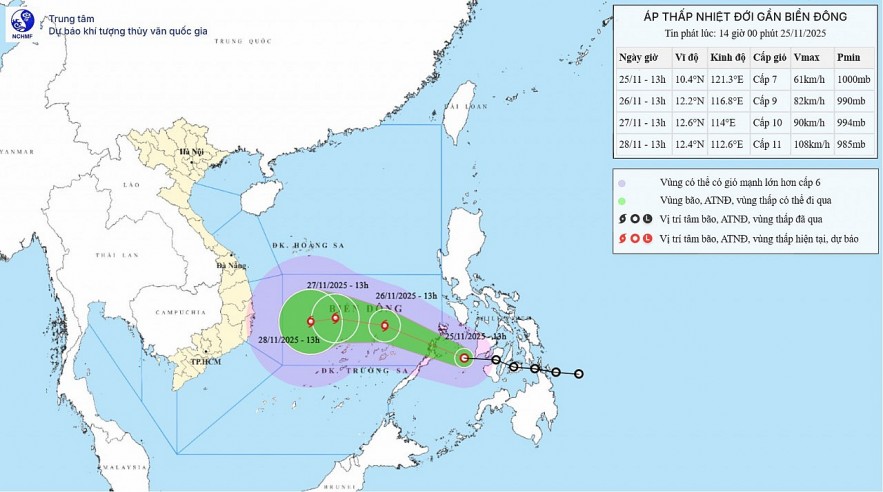 |
| Forecast trajectory and intensity of the tropical depression as of November 25. Source: NCHMF |
Additionally, forecasters said that after last night’s cold air surge, two more are expected to follow - one around November 26–27 and another around November 30.
The future strength and path of tropical storm No. 15 will likely depend on its interaction with these cold air waves. Meteorological agencies will closely monitor the system to provide timely updates.
Starting this evening, strong winds are expected to increase in the eastern part of the central East Sea, reaching level 6–7, and up to level 8–9 with gusts at level 11 near the storm’s center. Waves could rise to 4–6 meters, with very rough sea conditions.
From the afternoon of November 26 to 28, the central East Sea - including the northern part of the Truong Sa (Spratly) Archipelago - is expected to experience even stronger winds at levels 10–11, with gusts up to level 14. Waves may reach 7–9 meters, with extremely rough seas.
All vessels operating in these areas face the risk of thunderstorms, squalls, strong winds, and dangerous high waves.
 | Vietnam News Today (Nov. 22): Vietnam and South Africa upgrade bilateral relations to Strategic Partnership; High-level talks in Hanoi reinforce Vietnam–Czech strategic partnership; Czech Senate ... |
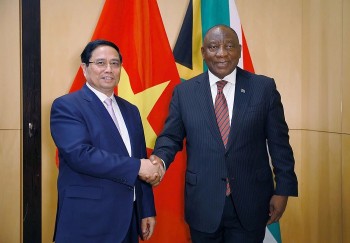 | Vietnam News Today (Nov. 23): Prime Minister Meets South Korean President on G20 Summit Sidelines Vietnam News Today (Nov. 23): Prime Minister meets South Korean President on G20 Summit sidelines; CPV delegation visits Spain to deepen strategic partnership; Vietnam–Israel trade ... |

